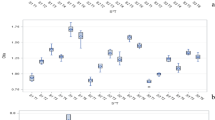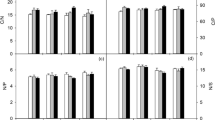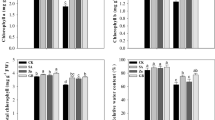Abstract
It is important to find methods, which may improve corn physiology, including nitrogen (N) metabolism, and yield production under drought stress. The use of plant growth regulators (PGR) is among the methods, which has been found effective on the alleviation of drought stress on corn physiology and yield. However, in this research, some new PGR, which has been rarely investigated and may improve plant nitrogen (N) under drought stress including (A) control, (B) 6-benzyl adenine (10,000 mg/L), (C) proline (2.5 ml/L), (D) glutamine (1 ml/L), (E) B + C, (F) B + D, (G) B + C + D, and (H) superoxide dismutase (2.5 ml/L) were proposed and examined on corn (genotype Single Cross 640) physiology and yield components under field conditions. The experiment was a split plot on the basis of a completely randomized block design with three replicates, and in addition to PGR (subplots) the main plots (drought stress) based on 70 (D1), 90 (D2) and 110 mm (D3) of evaporation from an evaporating pan were examined. Different corn physiology- and yield-related components including relative water (RW) and proline contents (Pro), weight of 100 grains (100GW), number of grains per corn (NGC), biological yield (BY), corn fresh yield (CFY), and grain yield (GY) were determined. According to the results, corn physiology and yield components were significantly affected by drought stress as Pro increased and RW and yield-related components decreased. However, interestingly the use of PGR (treatment G) significantly improved corn physiology and yield components by increasing RW (to a maximum of 63.81%), CFY (from a minimum of 80,542 kg/ha at control to a maximum of 100,263 kg/ha), and BY (from a minimum of 49,842 kg/ha at control to a maximum of 62,277 kg/ha). Although the effect of PGR was not statistically significant on GY, treatment G resulted in a 2500-kg increase compared with control. The interaction of drought stress and PGR significantly affected different corn physiology- and yield-related components except NGC and BY. The most effective PGR treatment on the alleviation of drought stress on corn physiology and yield production was treatment G containing 6-benzyl adenine, proline, and glutamine. It is possible to improve corn physiology and yield production under drought stress using the PGR tested in this research.




Similar content being viewed by others
Data Availability
The authors are not allowed to share their data.
Abbreviations
- RW:
-
Relative water content
- Pro:
-
Proline content
- BA6:
-
6-Benzyl adenine
- Glu:
-
Glutamine
- SOD:
-
Super oxide dismutase
- 100GW:
-
Weight of 100 grains
- NGC:
-
Number of grains per corn
- BY:
-
Biological yield
- CFY:
-
Corn fresh yield
- GY:
-
Grain yield
References
Alam R, Das DK, Islam MR, Murata Y, Hoque MA (2016) Exogenous proline enhances nutrient uptake and confers tolerance to salt stress in maize (Zea mays L.). Progr Agric 27:409–417
Bates LS, Waldren RP, Teare ID (1973) Rapid determination of free proline for water-stress studies. Plant Soil 39:205–207
Gu J, Li Z, Mao Y, Struik PC, Zhang H, Liu L, Wang Z, Yang J (2018) Roles of nitrogen and cytokinin signals in root and shoot communications in maximizing of plant productivity and their agronomic applications. Plant Sci 274:320–331
Kant S (2018) Understanding nitrate uptake, signaling and remobilisation for improving plant nitrogen use efficiency. Semin Cell Dev Biol 74:89–96
Khan MIR, Asgher M, Fatma M, Per TS, Khan NA (2015) Drought stress vis a vis plant functions in the era of climate change. Clim Change Environ Sustai 3:13–25
Kong F, Zhang T, Liu J, Heng S, Shi Q, Zhang H, Wang Z, Ge L, Li P, Lu X, Li G (2017) Regulation of leaf angle by auricle development in maize. Mol Plant 10:516–519
Miransari M, Bahrami HA, Rejali F, Malakouti MJ (2008) Using arbuscular mycorrhiza to alleviate the stress of soil compaction on wheat (Triticum aestivum L.) growth. Soil Biol Biochem 40:1197–1206
Miransari M (2011a) Interactions between arbuscular mycorrhizal fungi and soil bacteria. Appl Microbiol Biotechnol 89:917–930
Miransari M (2011b) Soil microbes and plant fertilization. Appl Microbiol Biotechnol 92:875–885
Miransari M, Smith D (2019) Sustainable wheat (Triticum aestivum L.) production in saline fields: a review. Crit Rev Biotechnol 39:999–1014
Mohammadi M, Asadi-Gharneh HA (2018) How the morphological properties of Mentha longifolia (L.) Huds. may be affected by geographical differences. J Photochem Photobiol B 178:237–242
Nuccio ML, Wu J, Mowers R, Zhou HP, Meghji M, Primavesi LF, Paul MJ, Chen X, Gao Y, Haque E, Basu SS, Lagrimini LM (2015) Expression of trehalose-6-phosphate phosphatase in maize ears improves yield in well-watered and drought conditions. Nat Biotechnol 33:862
Sajedi NA, Ardakani MR, Madani H, Naderi A, Miransari M (2011) The effects of selenium and other micronutrients on the antioxidant activities and yield of corn (Zea mays L.) under drought stress. Physiol Mol Biol Plants 17:215–222
Sami F, Yusuf M, Faizan M, Faraz A, Hayat S (2016) Role of sugars under abiotic stress. Plant Physiol Biochem 109:54–61
Shourbalal SKS, Soleymani A, Javanmard HR (2019) Shortening vernalization in winter wheat (Triticum aestivum L.) using plant growth regulators and cold stratification. J Clean Prod 219:443–450
Stutts L, Wang Y, Stapleton AE (2018) Plant growth regulators ameliorate or exacerbate abiotic, biotic and combined stress interaction effects on Zea mays kernel weight with inbred-specific patterns. Environ Exp Bot 147:179–188
Tahaei A, Soleymani A, Shams M (2016) Seed germination of medicinal plant, fennel (Foeniculum vulgare Mill), as affected by different priming techniques. Appl Biochem Biotechnol 180:26–40
Verma V, Ravindran P, Kumar PP (2016) Plant hormone-mediated regulation of stress responses. BMC Plant Biol 16:86
Wang H, Yang Z, Yu Y, Chen S, He Z, Wang Y, Jiang L, Wang G, Yang C, Liu B, Zhang Z (2017) Drought enhances nitrogen uptake and assimilation in maize roots. Agron J 109:39–46
Yang L, Fountain JC, Ji P, Ni X, Chen S, Lee RD, Kemerait RC, Guo B (2018) Deciphering drought-induced metabolic responses and regulation in developing maize kernels. Plant Biotechnol J 16:1616–1628
Zamani S, Naderi MR, Soleymani A, Nasiri BM (2020) Sunflower (Helianthus annuus L.) biochemical properties and seed components affected by potassium fertilization under drought conditions. Ecotoxicol Environ Saf 190:110017
Zhang H, Horgan KJ, Reynolds PH, Jameson PE (2010) 6-Benzyladenine metabolism during reinvigoration of mature Pinus radiata buds in vitro. Tree Physiol 30:514–526
Zhang X, Warburton ML, Setter T, Liu H, Xue Y, Yang N, Yan J, Xiao Y (2016) Genome-wide association studies of drought-related metabolic changes in maize using an enlarged SNP panel. Theoret Appl Genet 129:1449–1463
Funding
There was no funding for this research.
Author information
Authors and Affiliations
Contributions
All authors contributed equally to the manuscript.
Corresponding author
Ethics declarations
Conflict of interest
The authors do not have any conflict of interest.
Additional information
Handling editor: Rhonda Peavy.
Publisher's Note
Springer Nature remains neutral with regard to jurisdictional claims in published maps and institutional affiliations.
Rights and permissions
About this article
Cite this article
Noein, B., Soleymani, A. Corn (Zea mays L.) Physiology and Yield Affected by Plant Growth Regulators Under Drought Stress. J Plant Growth Regul 41, 672–681 (2022). https://doi.org/10.1007/s00344-021-10332-3
Received:
Accepted:
Published:
Issue Date:
DOI: https://doi.org/10.1007/s00344-021-10332-3




